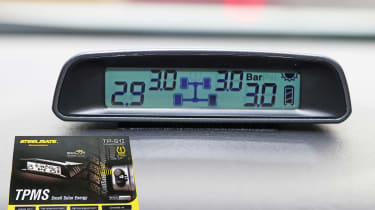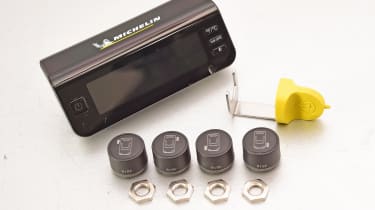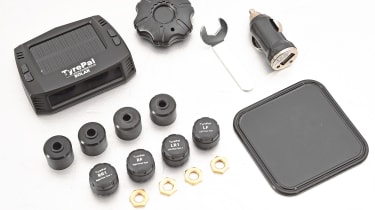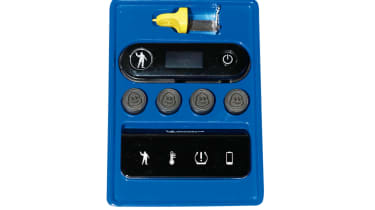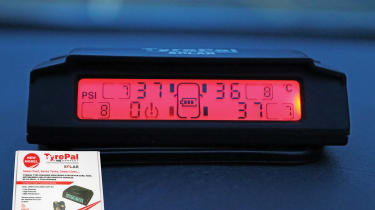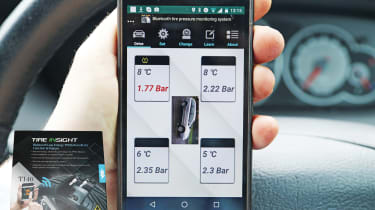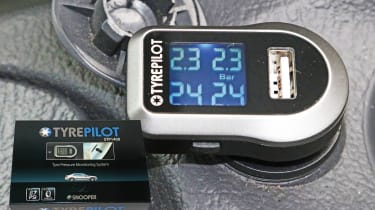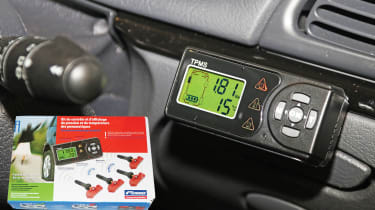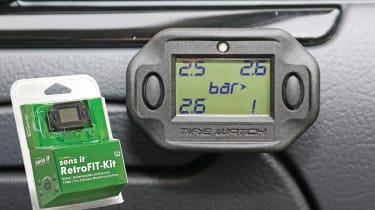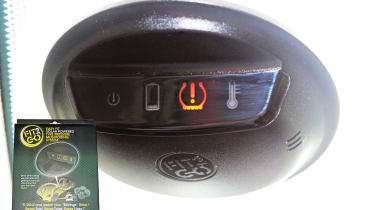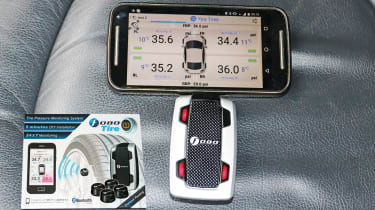Tyre pressure monitoring systems 2019
Keep track of tyre pressures, and boost safety, as we test top aftermarket monitoring system kits
In eight years of surveying 23,000 UK motorists’ tyre pressures, Michelin found 62 per cent were incorrect and 37 per cent of those dangerous.
This squanders money in increased fuel consumption and extra tyre wear, but also risks safety as handling deteriorates or tyres overheat. New cars have been fitted with mandatory tyre pressure warning systems (TPMS) since 2012, but there’s a number of retro-fit kits to bring the safety benefits to all. We hit the road to test some of the best.
How we tested them
We tested two types of system: external sensors that replace the valve caps, and those that are fitted inside the tyre. The former are easier to set up with tools provided, but the increased weight affects both valve stems and balance.
Internal sensors cost more and require professional fitting, unless of course you have the competencies and tools to carry the work out yourself, but otherwise, budget around £10 per tyre for a professional to sort.
• Auto Express all-season tyre test
The test compared readings at 22, 36 and 44psi against a calibrated gauge, plus reaction times and warnings. Consistency of readings was also rated over a 50-mile drive, as were online prices, correct at the time of testing.
Verdict
For a fit and forget internal system, look no further than the Steelmate TP-S1I, which wins overall. While the initial purchase and setup may be more expensive than most of the top external kits, the Steelmate offers customers the best mixture of price, features and accuracy.
Used - available now

2018 MINI
Countryman
46,861 milesAutomaticDiesel2.0L
Cash £14,900
2018 Vauxhall
Astra GTC
13,442 milesAutomaticPetrol1.4L
Cash £9,100
2020 BMW
3 Series
73,777 milesAutomaticDiesel2.0L
Cash £16,950
2020 Hyundai
Kona Hybrid
30,756 milesAutomaticPetrol1.6L
Cash £15,550- 1. Steelmate TP-S1I
Reviews
Steelmate TP-S1I
Type: Internal Price: Around £150
Rating: 5/5
Our test winner from Steelmate has its sensors mounted within the wheel rim, so pro fitting is required unless you have your own tyre changing kit. Also, the sensors and head unit need initial calibration, which isn’t very easy to master.
Still, all this is offset by superior security, longer battery life and real-time pressure readings displayed in the car on another solar-powered head unit. So unlike some on test, you don’t have to get out to see which tyre has a problem by looking for flashing LEDs on the sensor. The system proved accurate, too. The best balance of price, features and accuracy takes victory.
Michelin Tyre Pressure Management System
Type: InternalPrice: £79.95
Rating: 4.5/5
Produced with British specialist Fit2Go, this Michelin-branded system is convenient. The four sensors are marked for each wheel; you screw each one on to the valve of the correctly inflated tyre, and secure them with a supplied lock nut and spanner.
The sensors automatically pair with the display and give pressures for all four tyres. The monitor sits at the top of a windscreen and comes with a sticky pad and a rear solar panel. This is really the only position for the unit, because there’s no 12V option.
The power level is shown and it monitors pressure and temperature. On our test wheel we found the pressures were accurate and it responded promptly to pressure loss. It does the job if a windscreen mount works for you.
TyrePal Solar
Type: Internal Price: £99
Rating: 4/5
It’s £20 more expensive, but this unit gives you more options. TyrePal is solar-powered, yet also comes with a lead and adapter for charging from the 12V socket.
The sensors get protective covers, while a sticky pad holds the display on the dash, and there’s a tool to replace the sensor’s battery. With the Michelin you have to buy another sensor when the power cell fails. However, these sensors can’t be used with trailers; there are other versions for those.
Sensors are marked with their position and fit with a lock nut. The display is then set to each axle’s correct pressures. These must be a little above the cold settings to allow for pressure to rise as the tyre warms. Pressures and response to loss air were similar to the Michelin, and if the screen mount doesn’t work for your car this is a fine alternative.
Michelin Tyre Pressure Management System Expert
Type: ExternalPrice: Around £120
Rating: 4/5
Michelin’s system mixes a neat, solar-powered, in-car head unit with warning lights alongside a separate digital hand-held pressure reader. When the gauge is held against a sensor mounted on a tyre valve, we found that not only was the pressure reader’s display entirely accurate, but reactions to deflations were swift.
The system is designed to be entirely user-friendly and it succeeds (it is after all a newer version of the Fit2Go 4-wheel TPMS). You just screw the sensor on to the valve of a correctly inflated tyre and the set-up calibrates automatically. The instructions are even printed on a single sheet, for quick reference.
We also liked the fact that the system can connect to up to 12 tyre valve sensors – ideal if you tow. Two replacement sensors cost £24.95. A well thought-out external sensor package.
TyrePal Solar4
Type: External Price: Around £100
Rating: 4/5
Despite using the same sensors as the Tyre Pilot STP1400, this includes extra waterproof gaiters. In low light, the high-quality display is backlit, which goes red should changes in pressure or temperature be detected, alongside a flashing display and beeps. The unit reacts almost instantly to air loss and activates immediately as you drive off. Well priced, accurate and effective; we only wish it had an internal sensor option.
Tireinsight Smartphone TPMS Kit
Type: Internal Price: Around £200
Rating: 4/5
This Bluetooth low energy (BLE) system provided pressure and temperature readings simultaneously via the Google Play-based app (there’s also an iOS version). The software is well laid out and features pop-up messages for sudden deflation and abnormal pressures. Yet battery life was quoted as just three years. Impressive but expensive.
Tyre Pilot STP1400
Type: External Price: Around £100
Rating: 3/5
Snooper’s cheapest retro-fit system has a screen illuminated via the 12V power socket. It’s small but unobtrusive, pressure readings are accurate and warnings are clear and constant. Reactions to pressure changes were quick. We also liked the clamp design to keep it in place. But it lacks sophistication in this company.
Schrader AirAware TPMS 65594-67
Type: Internal Price: Around £170
Rating: 3/5
This is the only kit tested with a modern, all-rubber, snap-on tyre valve. Pressure readings were accurate, but it lacked an over-inflation warning. The screen feels cheap and doesn’t show all four tyre readings in one. It also lost communication with the sensors on three occasions, although it did reconnect automatically. While this veteran system has been improved over time, it needs more work.
Alligator sens.it RetroFIT-Kit
Type: Internal Price: Around £215
Rating: 3/5
Alligator’s sensors are easy to set up, and work up to 116psi, but took time to stabilise. While this is the most expensive kit here, its display looks cheap and instructions are in German. We didn’t like the way the temperature settings had to be accessed separately, either, or that the system doesn’t switch on automatically.
Buy now from Tpmwarehouse.co.uk
Fit2Go 4-wheel TPMS
Type: External Price: Around £100
Rating: 3/5
This is one of the most user-friendly system here. Fit2Go’s sensors self-calibrate, while the solar-powered, screen-mounted unit offers visual and audible alerts. It responded instantly to our pressure and deflation tests, and has a high temperature warning, but could be more accurate and you can’t tell which tyre is affected from the cabin.
FOBO Tire TPMS Bluetooth
Type: External Price: Around £150
Rating: 1/5
Real-time temperature and pressure readings are displayed in an attractive app and an in-car unit gives flashing alerts. Up to 12 sensors can be linked to an online account, but each one is heavy (11g). Plus, the test sample refused to pair with our Android smartphone. The warnings were inconsistent, and it’s pricey.
With monitoring tyre pressures sorted, why not read our best mini air compressors for cars group test?

